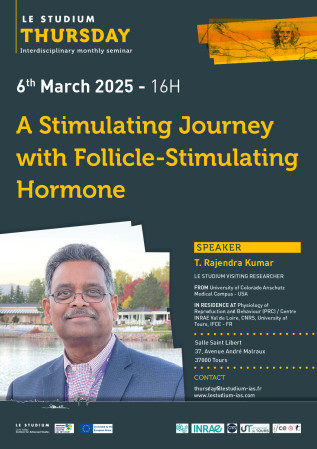Rajendra Kumar

From
University of Colorado Anschutz Medical Campus - USA
In residence at
Host scientist
Eric Reiter
BIOGRAPHY
T. Rajendra Kumar holds the highest degrees in reproductive physiology and endocrine biochemistry. Extensively worked on genetics and physiology of gonadotropins including gonadotropin synthesis, trafficking, secretion, and action for over 3 decades. Currently, he is a tenured professor and the Edgar L, Patricia M Makowski Family Endowed Chair, Associate Vice-Chair of Research and Director, Women’s Reproductive Health Research Program, Department of Obstetrics and Gynecology, University of Colorado Anschutz Medical Campus, USA. Specific expertise in engineering novel mouse models to study developmental regulation of reproductive function across the life span and molecular characterization using multi-omics approaches. He is a 2025 Distinguished Fellow of the Society for the Study of Reproduction (SSR).
His has experience in:
1) teaching, and mentoring trainees at all levels, and junior faculty within and outside the USA;
2) managerial skills in running an independent research laboratory including conducting innovative physiological experiments, interpreting, and discussing results and extending the mouse genetics studies to the bedside via clinical and commercial partnerships;
3) efficiently working with multi-PI driven largescale program projects nationally and internationally;
4) playing leadership roles in reproduction focus societies and society journals and organizing international symposia.
PROJECT
Transgenic mouse models to study follicle-stimulating hormone receptor (FSHR) function in reproduction
ollicle-stimulating hormone (FSH) is a pituitary-derived heterodimeric glycoprotein hormone. FSH binds to G protein coupled FSH receptors (FSHR) expressed in low abundance on ovarian granulosa cells. Activation of FSHR leads to granulosa cell proliferation and differentiation and estrogen production and these events are essential for female fertility. FSHR signaling pathway is highly conserved between mice and humans. Inactivating mutations in FSHR-encoding gene (Fshr -/-) in mice or women result in ovarian folliculogenesis arrest and female infertility. On the other hand, recombinant FSH treatment or activation of FSHR by agonists leads to enhanced female fertility. Traditional approaches to block/enhance FSHR-mediated actions involve peptide mimetics and poly/monoclonal antibodies and these approaches have many limitations including lack of specificity and feasibility. To overcome these, high affinity and highly potent human FSHR-specific nanobodies have been recently developed to study ligand-receptor interactions with greater specificity. However, the currently available human FSHR nanobodies do not cross-react with rodent FSHRs and thus their in vivo efficacy cannot be evaluated. In this proposal, we will develop state-of-the art humanized mouse models with ovary-targeted expression of human FSHR transgene on a Fshr -/-genetic background. Our hypothesis is that ovary-targeted expression of a human FSHR transgenic mouse line may be a novel in vivo screening platform for FSHR nanobodies and offer non-hormonal blockade of female fertility. In Aim 1, we will develop a humanized FSHR-expressing transgenic line and test genetic rescue Fshr -/- by this human FSHR transgene. In Aim 2, we will screen FSHR nanobodies in humanized FSHR transgenic line and establish their in vivo efficacy by analyzing end points including ovarian folliculogenesis and female fertility. These studies significantly impact and expand our basic knowledge of FSH-FSHR interactions on target cells and have implications beyond human fertility/infertility and may also extend into agricultural and veterinary species.

